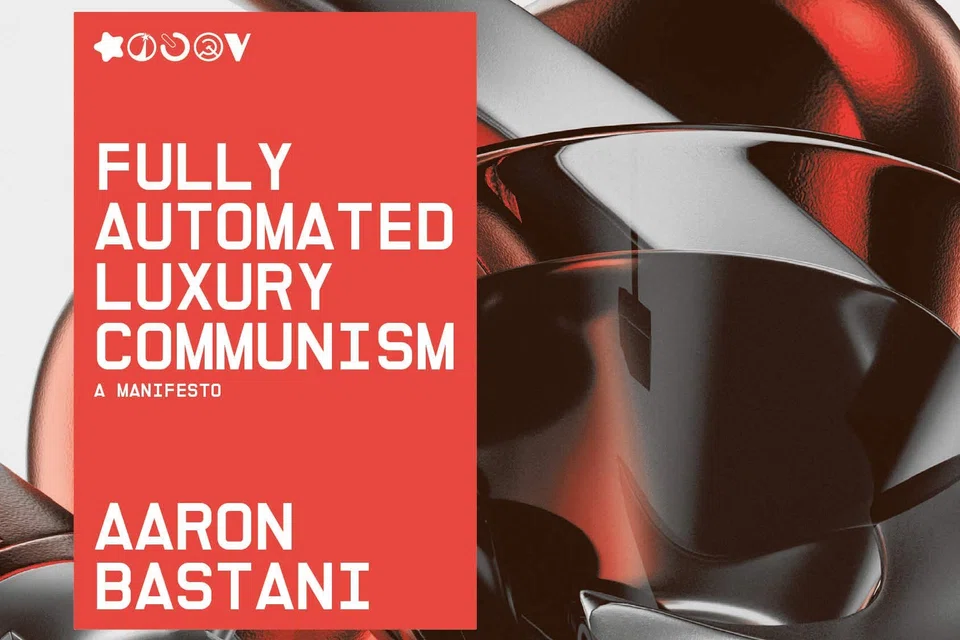A fully automated luxury communism for China's future?
Every month, anthropologist Bram Barclay discusses a book or concept and how it relates to contemporary China.

When Jack Ma and Elon Musk met at the World AI conference in Shanghai, much of the media spotlight focused on Elon wondering where the aliens were, and Jack Ma telling him he might want to spend less time in space and a little more time here on Earth. But buried in that conversation was an interesting comment. Jack Ma said that we need to prepare for a world in which people "live a life where they're only working three days a week, four hours a day".
To put that quote in context, just a few months ago, Jack Ma came under fire for endorsing the 9-9-6 work week, i.e., 12 hours of work a day, six days a week. "I personally think that 996 is a huge blessing," he said. "How do you achieve the success you want without paying extra effort and time?"
So, how do we get from working 12 hours a day, six days a week, to working 12 hours a week, total? Well, one potential way was floated this year in Fully Automated Luxury Communism (FALC), a book by leftist scholar Aaron Bastani.
In FALC, Bastani posits that the only problem with communism was that it arrived too early. He argues the experiments in communism we saw in the 20th century were doomed to fail, because they came before the technological advances that would actually allow for true abundance, and therefore the breaking of the capitalist system.
Bastani argues that humans have lived through three great disruptions: the agricultural age, the machine age, and the current information age.
Where the information age differs from the first two is that information has no scarcity value. Information wants to be free. In the agriculture age, you had crops and livestock and human labour, all of which depletes as it is used up. The same is true of the machine age, which requires raw materials like metals, and resources like fossil fuels. As these stocks diminish, they gain in value; there is an inevitable market that arises as scarcity drives demand and forces the price mechanism to work to create equilibrium with supply.
By contrast, information is not a scarce resource. The more information you use, the more information you have. A good example of this is music. In the past, music was pressed on vinyls or CDs in limited runs. If I had the CD, it meant someone else might not, unless more of the CDs were printed. If you wanted the CD, and I was the only person who had it, I would have to give it to you, or sell it or trade it. There was a market for it. But once the music became an MP3, we could both have it. From an information perspective, the field was levelled. One person having the information is the same as every person having it. And once music became information, it lost its value, which is why the music industry was in a crisis for much of the early 2000s and 2010s. It is only now with streaming services and imposed 'legal' scarcity (i.e. you'll be heavily fined if you're caught illegally trading music) has a market been able to survive for music. Most artists now make their money not off music itself, because it has lost so much value, but by touring and selling merchandise.

It's not just music. Many things are on track to become hyper-abundant in the information age, if Bastani's theory holds out. In FALC he talks about scarce resources being mined from space, about giant solar panel farms in the world's deserts generating free sustainable power, and medicine tailor-made for our individual genomes, creating a healthcare system that is hyper efficient and virtually free.
Bastani believes that if these technologies are harnessed by a strong left-leaning populist government and used to create Universal Basic Services (UBS)-things like free education for anyone who wants it, to any age or degree level, free healthcare, free internet and electricity, etc-then we could easily create a world in which very few people would need to work. Those who worked would be hyper specialised with an incredibly niche skillset, and would only need to work a few hours a day, or even a week. The rest could just live their life however they wanted.
This is the kind of world that Jack Ma was pointing to in his remarks at the World AI forum. He likes to refer to AI as "Alibaba Intelligence", and throughout his businesses he's trying to leverage AI to create efficiencies. Last year I wrote an article about He.Ma, the chain of smart supermarkets that Alibaba has heavily invested in. In one of their Shanghai branches they'd installed a robot restaurant. Hou Yi, the founder, proudly declared that already over 70% of his kitchen was fully automated. True enough, when I went, some of the only staff were the people cleaning the tables, and the woman who stood at the entrance and explained how to use the He.Ma app. I imagine they've already got rid of her.
Soon the gig economy, which for many low-skilled employees in China has been the only gig in town, will no longer be hiring. And then what? No-one seems to know.
Automation is happening fast in China. Traditional jobs, the so-called iron rice bowls of old, have largely disappeared, and most recent job creation has been in the fast-paced and insecure gig economy. The Chinese gig economy is dominated by apps like Didi Chuxing, a ridesharing app, and E.leme, which specialises in food delivery. Didi is already investing in autonomous cars, and E.leme has already trialled drone delivery. The biggest cost for these companies is their human labour force. No wonder they are trying everything they can to cut them. Soon the gig economy, which for many low-skilled employees in China has been the only gig in town, will no longer be hiring.

And then what? No-one seems to know. Jack Ma proposed education, but it's not really clear to what end, if there are no jobs. Bastani's book is conceptual; it tries to paint a vision of a potential future, but doesn't dwell too long on what the reality might be like when we get there (if we get there at all, but that's a whole separate issue).
All of this opens up very real questions about life itself. In her ethnographic account of factory workers laid off from a Beijing watch factory, anthropologist Jie Yang showed how some workers were retrained as peiliao, or talking companions, to try and coach their disenfranchised former colleagues away from alcoholism and depression. It is a bleak vision of the present that doesn't bode well for the future.






![[Photos] Fact versus fiction: The portrayal of WWII anti-Japanese martyrs in Taiwan](https://cassette.sphdigital.com.sg/image/thinkchina/3494f8bd481870f7c65b881fd21a3fd733f573f23232376e39c532a2c7593cbc)